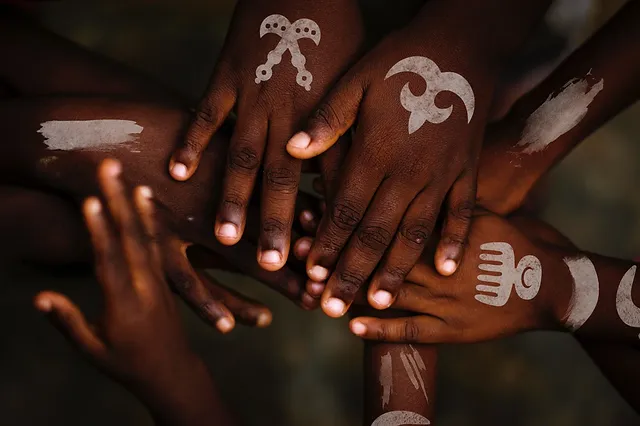Despite what many believe, unity keeps the world running. It promotes togetherness and collaboration among countries and states.
The word “Unity” is not taken lightly in the African tradition. Unity and togetherness helped Africans work side by side and hand in hand in the fight for freedom.
But with Africa being a continent whose people come from different communities, the word “unity” carries different meanings for different groups of people.
Let’s look at the different words Africans use to convey the idea of togetherness, unity, and oneness.
1. Ubuntu (Southern Africa)
Ubuntu is a term from Southern Africa that carries a powerful message of interconnectedness and mutual respect.
It is derived from the Zulu phrase “umuntu ngumuntu ngabantu,” loosely translated as “a person is a person through other people.”
This concept emphasizes that all individuals are linked in an intricate web of relationships and should treat each other with kindness, empathy, and compassion.
Ubuntu also highlights the importance of acknowledging our shared humanity, regardless of our differences in race, ethnicity, gender, religion, or social status.
2. Umoja (Swahili)
Umoja is a Swahili word that signifies the value of unity and togetherness. It emphasizes the importance of collaboration and community-building towards achieving common goals.
Umoja encourages individuals to work together towards shared objectives while respecting each other’s unique perspectives and contributions.
This concept recognizes that we are stronger when we come together as a collective rather than working in isolation.
3. Ubumwe (Nyarwanda)
The Rwanda emblem encompasses the court of arms, “Ubumwe, Umurimo, Gukunda Igihugu,” meaning “Unity, Work, Patriotism.”
Unity became most important after the brutal genocide that claimed many Rwandese lives during the Rwandan Civil War in the 1990s.
Only by unity would the people of Rwanda live together in harmony.
4. Sankofa (Akan)
Sankofa is a powerful symbol and word derived from the Akan language, which encourages individuals to delve into their past experiences to shape a brighter future.
The Sankofa bird promotes mutual respect and unity in the Akan community.
This concept emphasizes the importance of reflecting on one’s history, acknowledging both the positive and negative aspects, to gain valuable insights that can be used to guide future actions and decisions.

5. Imbizo (Zulu)
This term pertains to an assembly or conference. It is used when referring to a gathering or meeting, particularly in community decision-making processes that aim to promote unity and collaboration among the Zulu community.
Imbizo is a platform where people can come together to discuss pressing issues, share their views and opinions, and work towards finding solutions that benefit the entire community.
6. Bomoko (Lingala)
The word “Bomoko” in Lingala, a language spoken in parts of Central Africa, stands for the idea of solidarity and togetherness, which highlights the importance of supporting one another through life’s trials and tribulations.
This concept is particularly relevant in today’s world, where we face numerous challenges that require collective action and cooperation.
7. Isokan (Yoruba)
Isokan is a Yoruba term that represents the essence of “oneness.” It highlights the significance of unity in propelling progress and development for individuals and communities.
The concept behind Isokan is rooted in the belief that we are all interconnected and interdependent; thus, working together towards a common goal is essential for achieving success.
8. Hadin kai (Hausa)
This term translates to “Cooperation.” When a group of people cooperates while working towards a common goal, this promotes unity and togetherness.
In Nigeria, Hadin Kai is used with reference to the Nigerian Army. The phrase conveys the idea that success in combatting insurgency can only result from the nation working together in unity.

9. Harambee (Swahili)
This word promotes collaboration among people with different backgrounds or interests. It translates to “let’s pull together,” emphasizing the need for individuals to pool their resources and efforts to achieve a common objective.
This concept is rooted in the Africans’ fight for freedom, conveying the idea that when people work together towards a shared goal, they can accomplish more than they would individually.
10. Sawubona (Zulu)
Sawubona is a beautiful Zulu phrase with a profound meaning and significance. It simply translates to “I see you,” which is a powerful message that goes beyond mere recognition of one’s presence.
It speaks to acknowledging each other’s humanity, regardless of our differences, thus promoting unity.
11. Unhu (Shona)
Unhu, in the Shona language, emphasizes that all individuals are interconnected and encourages us to treat one another with empathy, kindness, and respect.
This idea is similar to “Ubuntu,” which emphasizes the importance of treating others with compassion and understanding.
It shows that recognizing our shared humanity and striving to build connections with those around us can create a more harmonious world in which everyone feels valued and respected.
12. Ubunye (Xhosa)
Ubunye represents the idea of togetherness and unity while acknowledging and respecting the individual identities of each member involved.
It emphasizes the importance of working collaboratively towards a common goal while recognizing and valuing each person’s unique perspectives, experiences, and contributions.
Ubunye means the display of mutual respect, understanding, and support while striving towards greater harmony and cohesion.
Other African Words You Should Know:
The African words for unity highlight the importance of coming together and working collaboratively. Despite the diverse cultures in Africa, these words showcase the shared values that unite African communities and contribute to their strength.

